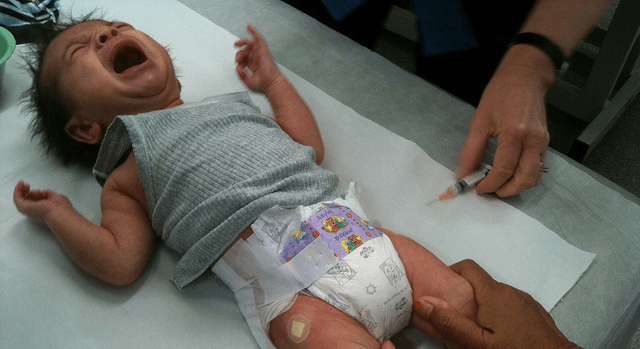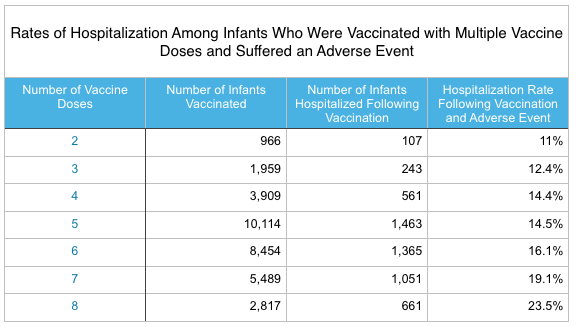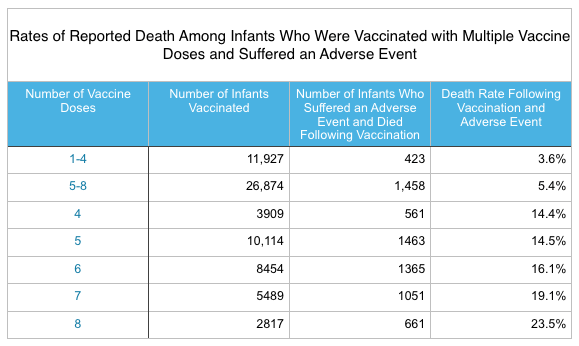
Time and time again, VacTruth has published heartbreaking stories involving infants who have received multiple vaccinations in one visit. Many of these infants have suffered irreversible brain injuries or death as a result.
Currently, an infant as young as eight weeks of age can receive up to ten doses of vaccinations in one visit, and in one particular case, a child received thirteen doses, which, sadly, led to his death. [1]
Until recently, there have been very few studies for parents to examine outlining the facts surrounding the dangers of multiple vaccinations. However, this is about to change.
Statistics Show Multiple Vaccinations Are Dangerous to Young Babies
A few weeks ago, Neil Z. Miller published a paper titled Combining Childhood Vaccines at One Visit Is Not Safe. [2] Using data taken from the Vaccine Adverse Event Reporting System (VAERS) website, Miller was able to prove that the more vaccines a child received at any given time, the more likely it was for an adverse reaction to occur.
In addition to the data outlined in the following table, based on 38,801 VAERS reports, he stated:
“… Of the 38,801 VAERS reports that we analyzed, 969 infants received two vaccine doses prior to the adverse event and 107 of those infants were hospitalized: a hospitalization rate of 11%. Of 1,959 infants who received three vaccine doses prior to the adverse event, 243 of them required hospitalization: 12.4%. For four doses, 561 of 3,909 infants were hospitalized: 14.4%. Notice the emerging pattern: Infants who had an adverse event reported to VAERS were more likely to require hospitalization when they received three vaccine doses instead of two, or four vaccine doses instead of three.”
He continued that:
“… Of 10,114 infants who received five vaccine doses prior to the adverse event, 1,463 of them required hospitalization: 14.5%. For six doses, 1,365 of 8,454 infants were hospitalized: 16.1%. For seven doses, 1,051 of 5,489 infants were hospitalized: 19.1%. And for eight doses, 661 of 2,817 infants were hospitalized: 23.5%. The hospitalization rate increased linearly from 11.0% for two doses to 23.5% for eight doses.”
In other words, the more vaccines that an infant received, the more likely they were to suffer an adverse reaction.
Miller explained that:
“Of the 38,801 VAERS reports that we analyzed, 11,927 infants received one, two, three, or four vaccine doses prior to having an adverse event, and 423 of those infants died: a mortality rate of 3.6%. The remaining 26,874 infants received five, six, seven, or eight vaccine doses prior to the adverse event and 1,458 of them died: 5.4%. The mortality rate for infants who received five to eight vaccine doses (5.4%) is significantly higher than the mortality rate for infants who received one to four doses (3.6%), with a rate ratio(RR) of 1.5 (95% CI, 1.4-1.7). Of infants reported to VAERS, those who had received more vaccines had a statistically significant 50% higher mortality rate compared with those who had received fewer.”
According to Miller, children below the age of six weeks receiving more than one vaccination are more likely to suffer an adverse reaction than children over the age of six months.
During his study, he discovered that not only did the child’s age determine whether or not they were at heightened risk of an adverse reaction but it also determined the risk of them dying prematurely.
After examining a colossal 38,801 adverse events reported to the VAERS database, Miller and his team stated that:
“… Of the 38,801 VAERS reports that we analyzed, 765 concerned infants six-weeks-old or younger who received one or more vaccine doses prior to the adverse event, and 154 of those infants were hospitalized: a hospitalization rate of 20.1%. Of 5,572 infants aged six months at vaccination, 858 were hospitalized: 15.4%. Of 801 infants who were nearly a year old when they were vaccinated, 86 were hospitalized: 10.7%. The hospitalization rate decreased linearly from 20.1% for neonates to 10.7% for older infants. linear regression analysis of hospitalization rates as a function of patient age yielded an R squared of 0.95.
In the 38,801 VAERS reports we analysed, 26,408 infants were younger than six months. After receiving one or more vaccine doses, 1,623 of those infants died: a mortality rate of 6.1%. The remaining 12,393 infants were between six months and one year of age. After receiving one or more vaccine doses, 258 of them died: 2.1%. The mortality rate for vaccinated infants younger than six months was significantly higher than the mortality rate for vaccinated infants between six months and one year, with an RR=3.0 (95%CI, 2.6-3.4). Infants who had an adverse event reported to VAERS were significantly more likely to be hospitalized or die if they were younger rather than older at the time of vaccination.”
These figures are damning, so, how worried should be parents be?
Should Parents Be Concerned?
As with any researcher, scientist, or professional, Miller was only able to work with the statistics available at the time. However, as many of us are aware, the number of adverse reactions being reported to the VAERS website are said to be a mere fraction of the true figures and the limitation of VAERS has been discussed in detail on websites such as Harpocrates Speaks and Vaccine Safety. [3, 4]
This is of particular concern as more and more US states are choosing to mandate childhood vaccinations, thus effectively force-vaccinating large populations of young children with multiple vaccinations now understood to be potentially life-threatening.
In 2006, VP nominee Tim Kaine signed a mandate for sixth grade Virginia girls to receive the HPV vaccine, before the research on the “fast-tracked” vaccine was complete. Subsequent follow-up research shows that those vaccinated have 2.5 times the rate of serious adverse reactions than the rate of death from cervical cancer.
A Canadian study showed that 10% of those vaccinated end up in the ER. Autoimmune disease, infertility, and death have been widely reported after the HPV vaccine. [5]
New research shows that the vaccine targets brain proteins in an experimental animal model, backing up evidence obtained from postmortem brain samples of two girls who died after receiving the HPV vaccine. [6]
In a recent exposé by Sanevax, they stated:
“During the last two weeks, it seems every time you turn around you find a news article singing the praises of HPV vaccines. It all started with a paper entitled “Prevalence of HPV After Introduction of the Vaccination Program in the United States” co-authored by Markowitz, Liu, Hariri, Steinau, Dunne and Unger of the CDC [1] that has been widely quoted to promote HPV vaccination among the teens, claiming “HPV vaccine more effective than expected.”
It’s all well and good to quote the newest CDC publication, but one would expect any journalist worthy of their title to at least read and perhaps even analyze the original before making such bold statements as the one above.” [7]
Apparently not, as according to the President of Sanevax, Norma Erickson, the paper was full of inaccuracies. She wrote:
“The authors claimed the “HPV DNA prevalence was analyzed in cervicovaginal specimens …” In fact, in the Methods section they disclosed that the women who were examined in a mobile examination center (a van) were asked to self-collect a cervicovaginal sample.
However, in real life the average American woman cannot collect any uterine cervicovaginal epithelial cells at the transformation zone where the “cancer causing” viruses are known to infect. Think about it ladies, when was the last time anyone (other than the CDC) asked you to collect your own Pap smear sample? Therefore, this is false claim 1.
The authors claimed, “The surveys are designed to be nationally representative of the civilian, noninstitutionalized US population.”
However, average American women are usually examined in a board-certified gynecologist’s office, not in a van; the cervicovaginal specimens are collected with a Pap smear brush through a speculum, not a Q-tip. This is false claim 2.
In the Methods section, the authors stated “In 1999 to 2006, Mexican-Americans, non-Hispanic blacks, low-income non-Hispanic whites and others, as well as adolescents aged 12 to 19 years, were oversampled.” “In 2009 to 2012, all Hispanics were also oversampled and in 2011 to 2012, Asians were also oversampled.”
It is well known that prevalence rates of individual HPV genotypes or subtypes among different ethnic groups of a population are different. Therefore, to compare the data obtained in the groups of women in 1999 to 2006 with those obtained in the groups of women in 2009 to 2012 is meaningless. It amounts to “comparing apples and oranges.”
… Therefore, the authors knew or should have known that their genotyping results were not reliable, and the difference in any two sets of data could have been due to faulty methodology.”
In fact, Gardasil was one of the earliest vaccinations to be mandated. Since then, according to the Immunization Action Coalition, several vaccinations have been mandated in many states throughout the US. [8]
With at least 271 new vaccinations in the pipeline, it appears that parents are in for a worrying time. [9]
Conclusion
Neil Z. Miller has outlined some extremely alarming facts and the situation could be far worse, with many adverse reactions left unreported. However, despite his efforts, no mainstream media outlet has reported on this factual and evidence-based paper.
Facts are facts, and we, at VacTruth, believe that the time has come to put a stop to this madness. We urge parents to send a copy of Miller’s paper to all relevant health and government departments before it is too late.
References
- https://vactruth.com/2015/04/23/baby-dies-after-13-vaccines/
- http://www.jpands.org/vol21no2/miller.pdf
- http://www.harpocratesspeaks.com/2013/11/vaers-few-things-we-need-to-discuss.html
- http://www.vaccinesafety.edu/VAERS.htm
- http://www.sciencedirect.com/science/article/pii/S0264410X16002036
- http://www.ncbi.nlm.nih.gov/pubmed/27421722
- http://sanevax.org/cdc-hpv-vaccines-science-shameless-promotion/
- http://www.immunize.org/laws/
- http://healthimpactnews.com/2015/there-are-271-new-vaccines-in-big-pharmas-pipeline/


